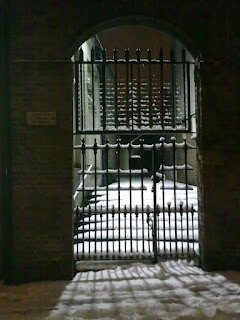'Investment, Stability, Growth', 'Austerity, Debt, Unemployment', the rhetoric makes it hard to distinguish the 'yes' from the 'no' side of the argument in Thursday's upcoming Fiscal Treaty referendum. I haven't met anyone who can tell me, with any accuracy or understanding, what they're being asked to vote for or whether they understand that though they're voting for one specific thing, their decision will alter a bunch of other things in our lives.
When I decided to put my thoughts on this subject in my blog, I never thought putting my thoughts in words could be so difficult, either. In fact, I was three quarters the way through my first draft when a drop down window suggested I had 'logged out' and would I like to 'log in' again? I said 'yes', since it seemed the logical thing to do as I had no recollection of 'logging out' in the first place and simply wanted to get back to where I was. But, as these things go, opting for a 'yes' meant I lost everything I had already written.
No-one thought to consider the consequences of their actions when the so-called captains of finance and property development were riding the pig's back with our money and future prospects over the past 15 years but the democratically elected political leaders, in whom we entrusted our future well being, were quick to pledge that trust to bail out the profligate bankers when things got rough. There has even been a subtle change in language. Now 'we' are paying back 'our' debt.
I don't own a house or a car, never mind a holiday home in Croatia or Marbella. I don't have investment properties in a ghost estate in Mullingar or any other 'desirable' site in backwater Ireland. I pay my taxes, live frugally and within my meagre means.
Ireland was a sorry sight in the 1980s. The young and talented fled this country in their droves and settled, often illegally, in the suburbs of New York, San Francisco, Boston or Sydney. They came back in the '90s, lured by the promise of 'investment, stability and growth', slowly but with increasing frequency and, for a while there was growth and a surge of belief in a country that could lift itself out of the quagmire of poverty and destitution. Ireland became synonymous with ingenuity and innovation. Then the rot set in. My mother had a great phrase about people who got 'notions' about themselves. She'd say 'shit hit with a stick, flies high' and, as gravity teaches us, all things will fall.
The notion that if we're 'good' and vote 'yes', we'll be given a bag of sweets and can aspire, in some vague and distant future, to sit at the table again, with the 'big people', is anathema to me. I say, 'where's our pride?' and 'we've done it before, we can do it again.' A 'no' vote guarantees as much uncertainty in our future, I believe 'short term', prospects as a 'yes' vote pretends not to. I think a 'no' vote is more honest.
When I decided to put my thoughts on this subject in my blog, I never thought putting my thoughts in words could be so difficult, either. In fact, I was three quarters the way through my first draft when a drop down window suggested I had 'logged out' and would I like to 'log in' again? I said 'yes', since it seemed the logical thing to do as I had no recollection of 'logging out' in the first place and simply wanted to get back to where I was. But, as these things go, opting for a 'yes' meant I lost everything I had already written.
No-one thought to consider the consequences of their actions when the so-called captains of finance and property development were riding the pig's back with our money and future prospects over the past 15 years but the democratically elected political leaders, in whom we entrusted our future well being, were quick to pledge that trust to bail out the profligate bankers when things got rough. There has even been a subtle change in language. Now 'we' are paying back 'our' debt.
I don't own a house or a car, never mind a holiday home in Croatia or Marbella. I don't have investment properties in a ghost estate in Mullingar or any other 'desirable' site in backwater Ireland. I pay my taxes, live frugally and within my meagre means.
Ireland was a sorry sight in the 1980s. The young and talented fled this country in their droves and settled, often illegally, in the suburbs of New York, San Francisco, Boston or Sydney. They came back in the '90s, lured by the promise of 'investment, stability and growth', slowly but with increasing frequency and, for a while there was growth and a surge of belief in a country that could lift itself out of the quagmire of poverty and destitution. Ireland became synonymous with ingenuity and innovation. Then the rot set in. My mother had a great phrase about people who got 'notions' about themselves. She'd say 'shit hit with a stick, flies high' and, as gravity teaches us, all things will fall.
The notion that if we're 'good' and vote 'yes', we'll be given a bag of sweets and can aspire, in some vague and distant future, to sit at the table again, with the 'big people', is anathema to me. I say, 'where's our pride?' and 'we've done it before, we can do it again.' A 'no' vote guarantees as much uncertainty in our future, I believe 'short term', prospects as a 'yes' vote pretends not to. I think a 'no' vote is more honest.

